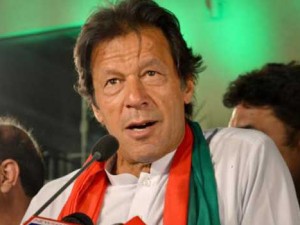- CM used discretionary powers to allocate funds for Haqqania
 ISLAMABAD, July 4: Chairman Pakistan Tehreek-e-Insaaf (PTI), Imran Khan has said that the provincial chief minister used his discretionary powers to allocate the funds for Haqqania Madrasa without his knowledge and even without informing some of his cabinet ministers.
ISLAMABAD, July 4: Chairman Pakistan Tehreek-e-Insaaf (PTI), Imran Khan has said that the provincial chief minister used his discretionary powers to allocate the funds for Haqqania Madrasa without his knowledge and even without informing some of his cabinet ministers.
Speaking to VOA at his Bani Gala residence near Islamabad, Imran Khan said he was unaware of the funding for Haqqania madrasa until the media drew his attention to it.
Imran Khan said that he has now instructed the provincial authority to submit a report to him to justify the allocation. “Under Pakistan’s constitution, a party chief is empowered to do so and can dismiss a public office holder if he or she goes against party policy.”
“The situation is evolving right now. What we want the KP Government, because as I said I too only learnt about this specific madrasa on a TV program when I was asked this question. So, what we want the KP government to do now is to announce exactly how this money will be spent, how is it going to mainstream this madrasa, which is one of the main madrasas in KP, and we have been assured by the government that in the next few days they will give us the details about how specifically this money will be spent,” Imran Khan said. It may be noted that the Darul Uloom Haqqania seminary, or madrasa, headed by Samiul Haq, a former senator, is located in the Khyber Pakhtunkhwa (KP) province, which borders Afghanistan.
Both Mullah Omar and Jalaluddin Haqqani – founders of Afghanistan’s Islamist Taliban and the lethal Haqqani network respectively – are believed to have studied in the Haqqania madrasa. It is reported that Taliban leader Mullah Akthar Mansoor, who was killed in a U.S. drone strike in May, was also a former student.
Haq’s madrasa, where about 4,000 students are enrolled, has been widely known for links, and publicly expressed sympathies, to the Taliban fighting local and U.S.-led international forces in Afghanistan. That association has won the Islamic cleric the title of “Father of the Taliban.”
The political party ruling the Pakistani province is headed by legendary cricketer-turned politician Imran Khan, leader of the Pakistan Tehreek-e-Insaf (PTI) party and a staunch critics of the U.S.-led anti-terrorism war in the region. He is also a strong opponent of Prime Minister Nawaz Sharif and is popular among educated Pakistani youth.
While provincial ministers have been defending the financial grant allocated for the seminary as part of efforts to “mainstream” thousands of madrasas around the province, Khan has tried to distance himself from the decision, although he reiterated his support for introducing reforms in religious institutions.
Imran Khan stopped short of agreeing when asked whether he might instruct the provincial government to cancel the funding for the seminary in the face of growing demands from political opponents, media commentators and civil society activists.
“Well, it depends where the money is being spent, if this money is going to mainstream the students who at the moment are basically marginalized. I mean, again, the party policy is to mainstream the students from these madrasas. As I said, exactly how it is going to be done we are waiting the report from the chief minister,” Imran Khan said.
He said there are about 2.2 million students in madrasas across the province and they all come from families unable to pay fees in private or government schools, so there is a need to teach them modern subjects to enable them to get jobs.
“So, our main concern is that we should be bringing these people into mainstream, and so that they become part of the society. Marginalization everywhere in the world, now we know, leads to radicalization. The ISIS (or Islamic State) has mainly got recruits from Muslim communities living in Europe who are marginalized,” Khan asserted. -DNA



